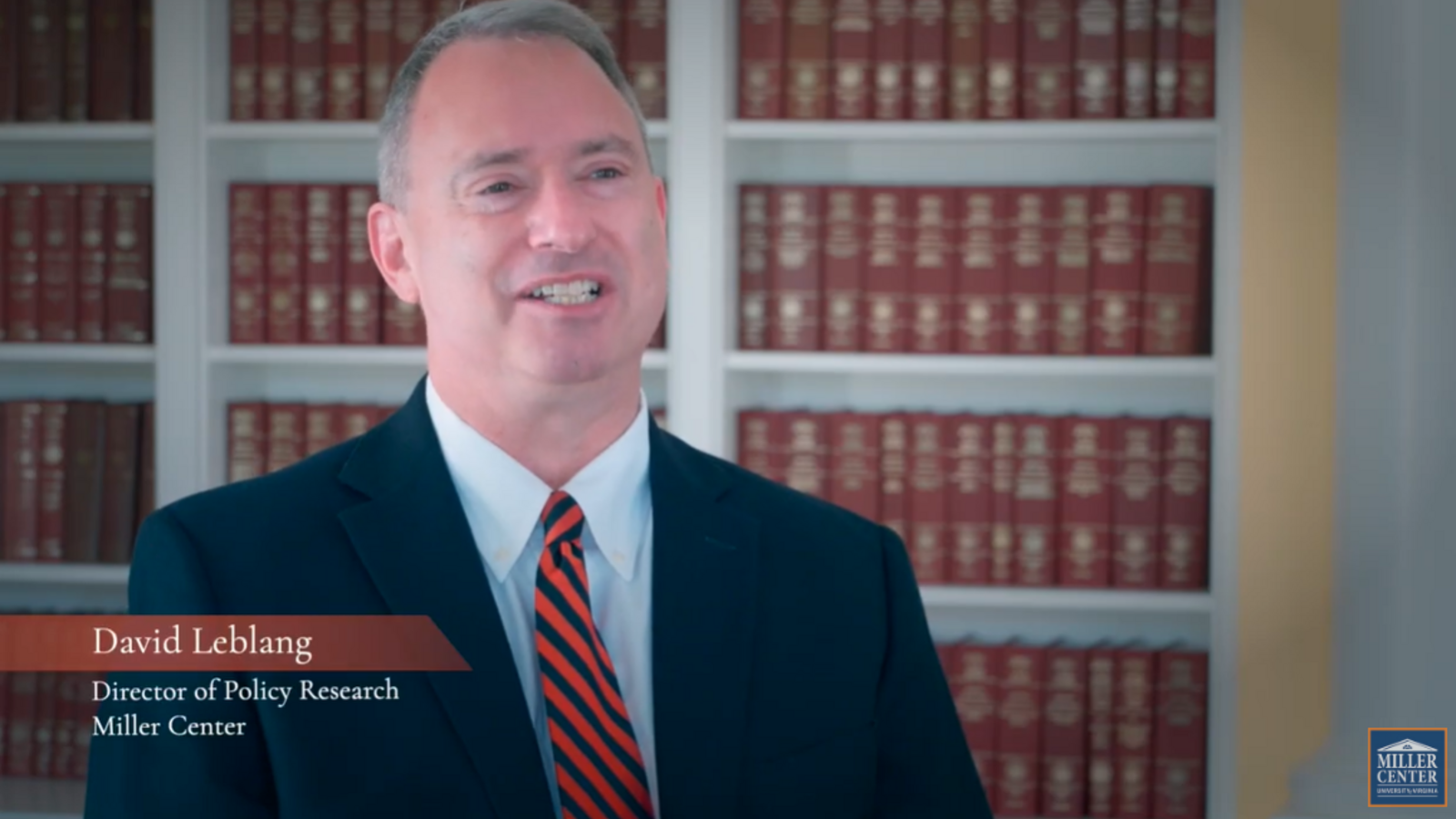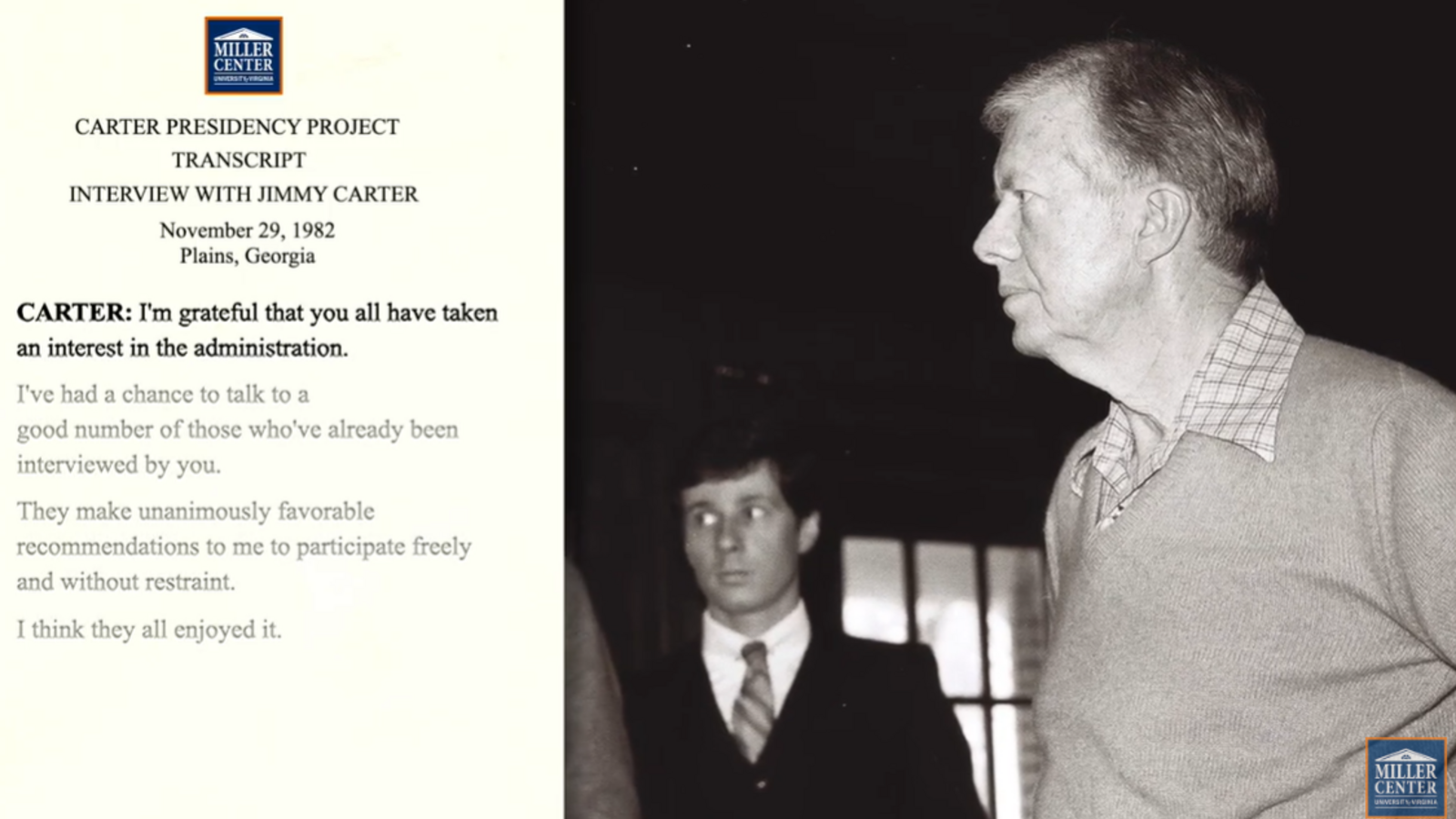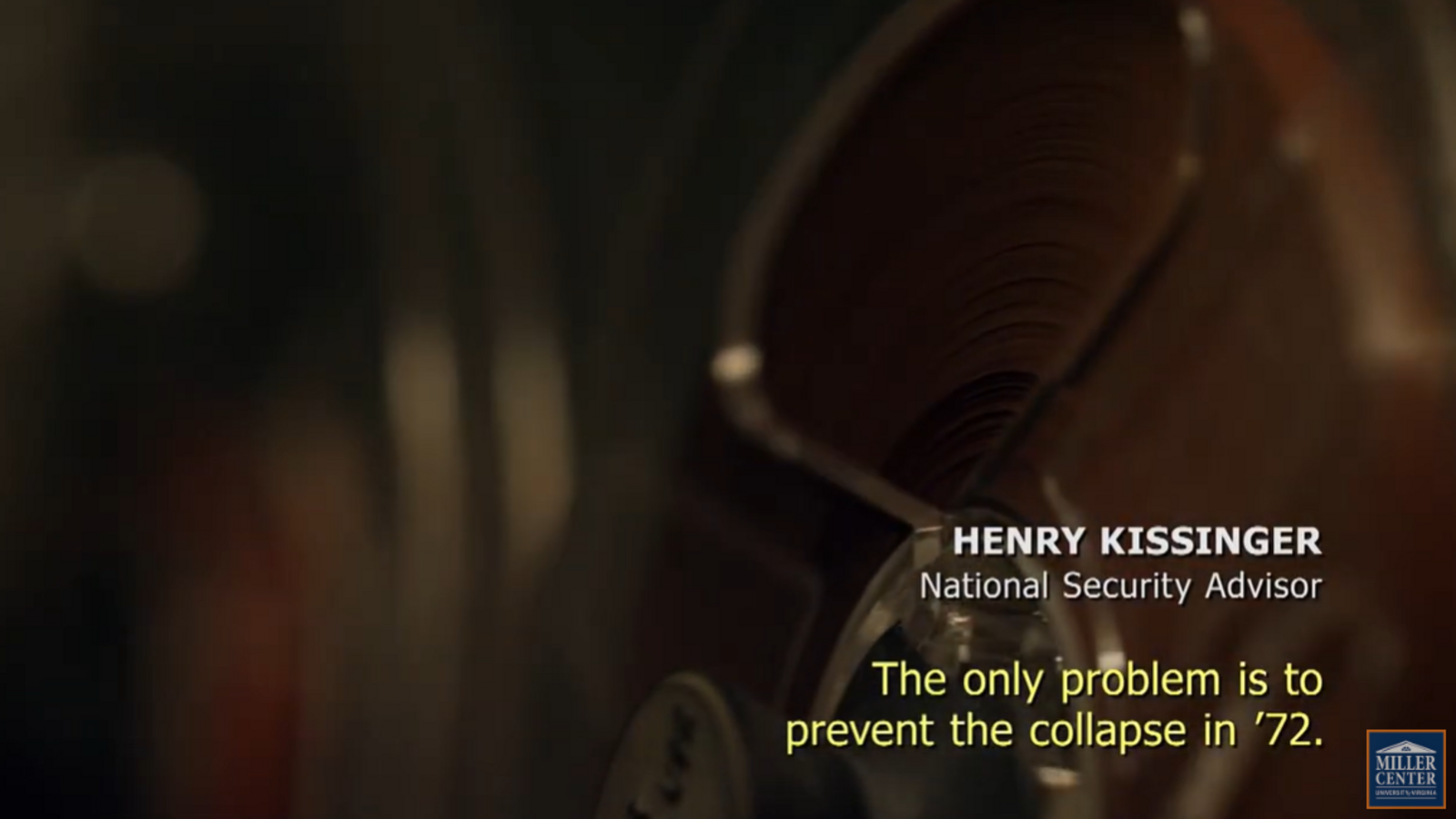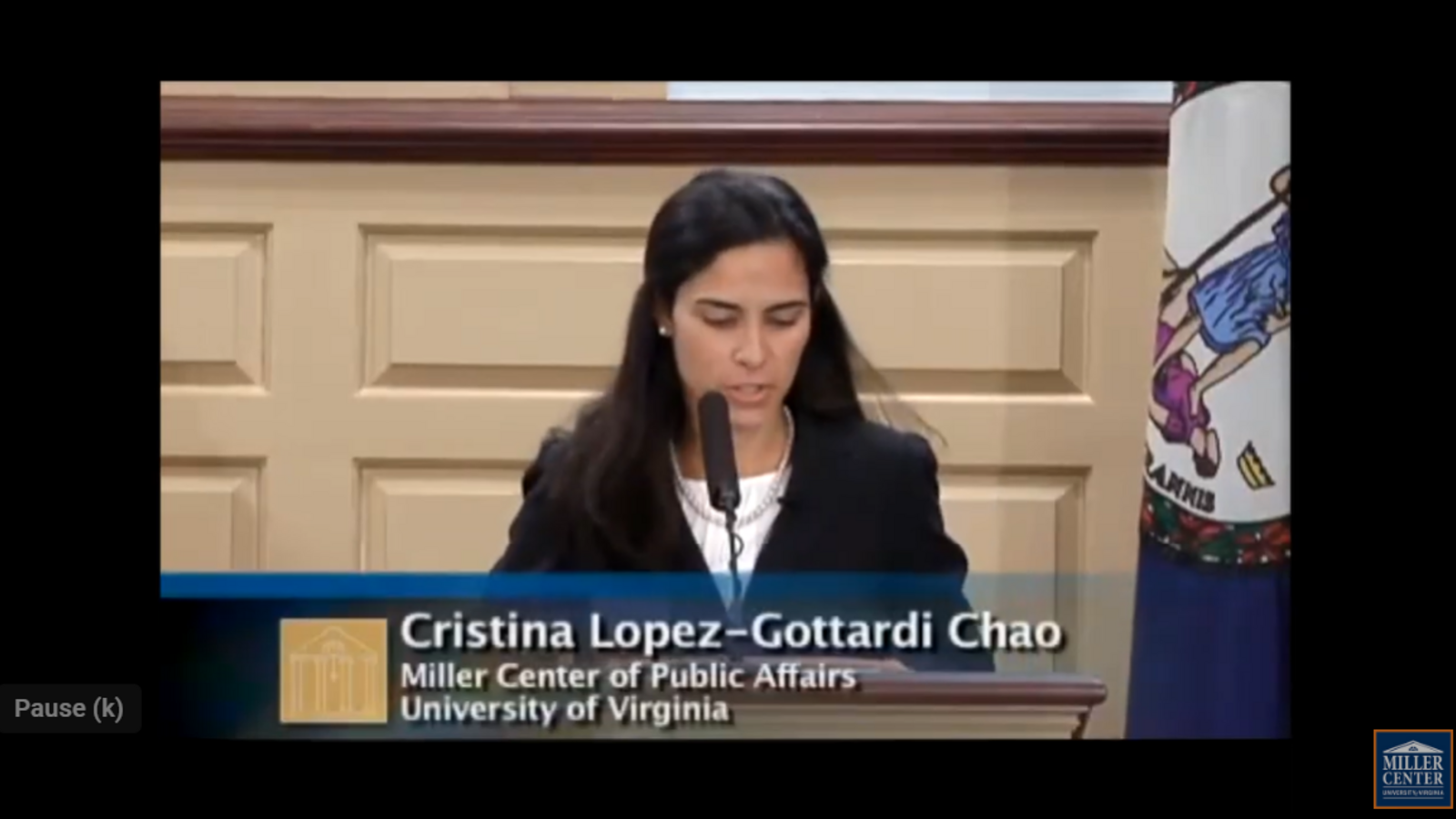Who we are
The Miller Center is a nonpartisan institution at the University of Virginia that explores how the American presidency meets national priorities and engages scholars with leading citizens to help solve major problems.
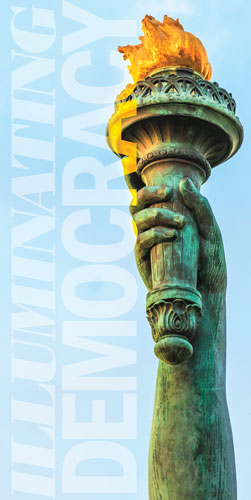
Illuminating democracy
We see a better way for the nation.
A more informed democracy. A nation full of leaders guided by intelligence and driven by an inner need for truth—leaders who know that you have to look back to see ahead, that to comprehend our present, you must first understand our past.
At the Miller Center, we strive to illuminate presidential and political history accurately and fairly. To shine a light on all the ways our democracy has worked—and all the times America has struggled. To inspire America’s leaders with unbiased insights, especially on the presidency, that advance democratic institutions and the public good.
Now beginning our sixth decade, we make our home at the University of Virginia, the nation’s first presidential university, founded by Thomas Jefferson. We carry forward a unique nonpartisan tradition, generating scholarship in the public interest to help guide the future of American democracy.
Listening to presidents
The United States doesn’t have just one presidency. It’s an American institution with discrete administrations—each of which we learn from as they experience both successes and failures.
The U.S. presidency includes a small and select group of individuals who have led what is now the most important country in the world, humankind’s most powerful military force, and a government that employs millions—and on whom many millions more depend.
From this one office issue forth the critical decisions that affect countless lives around the world and shape the course of history. Only this small club of leaders, and those closest to them, could truly understand the power of the presidency and what it means to wield it.
At the Miller Center, we provide the world’s most complete understanding of the U.S. presidency.
- Through our unique collection of Secret White House Tapes, we eavesdrop on presidents from Franklin Roosevelt to Richard Nixon. They may forget that someone is listening, but we are there to hear their intimate conversations with advisors, world leaders, loved ones, and friends--thousands of hours of Oval Office recordings, each minute holding the potential to let us see history with greater clarity.
- We also explore the most recent administrations—every presidency from Gerald Ford to Donald Trump—through our Presidential Oral History Program. Leading days-long intensive debriefings with scores of the most important players closest to each president, Miller Center scholars ask probing questions, capture irreplaceable memories, and discover new perspectives on events many of us will always remember—and others that took place behind the scenes. These are lessons only former presidents and their closest advisers can teach us, and the Miller Center is there to synthesize them.
- Our experts in Presidential Studies are pursuing an ambitious research agenda to explore new frontiers in understanding the presidency. Two dozen leading presidential historians, policy scholars, and former senior government officials are working to answer such questions as How can presidents be effective in the 21st century with powers conferred back in the 18th? How can a president secure accomplishments when the opposing party controls Congress—or avoid overreach when his party dominates all three branches of government? How can presidents promote unity in an increasingly diverse society? By researching these and other urgent questions, the Miller Center is helping shape the most powerful office in the world and strengthen our democracy for future generations.
- In September 2025, the Miller Center convened more than three dozen experts on the American presidency—senior officials of Democratic and Republican administrations, top presidency scholars, and journalists—for a two-day Conference on the American Presidency to discuss challenges facing America's highest office. At a time when American citizens are increasingly questioning key institutions in government and society, participants of good will from across society committed to working together to address common challenges. Like many Americans, conference participants expressed deep concern about the state of American institutions and the polarization that divides the country, as well as fears that the presidency itself, as currently designed and managed, is contributing to that division.
Modeling civil dialogue
An era of bitter partisanship divides Washington. Citizens are frustrated—with our government and with each other. Basic needs go unmet. Basic questions go unanswered. And rational dialogue seems to grow more distant with each passing day.
It’s tempting to think that we just disagree too much. But it’s not that we disagree, but rather how, that causes so many of our problems. Instead of focusing on issues, our political dialogue attacks motivation and character. We paint those who disagree with us as corrupt, evil, ignorant, or stupid. The vitriol infects our politicians, our media, even our local neighborhoods. Ultimately it undermines the very faith we have in our political system.
At the Miller Center, we believe that opposing positions can both have merit; that we can investigate questions of fact and discuss questions of opinion; that we can be open to changing our minds; and that our political system benefits from compromise.
All of these values have been at the heart of our mission since our founding in 1975. That’s why every year we bring together Republicans and Democrats, liberals and conservatives. We convene dozens of events fostering civil and intellectual dialogue among scholars, politicians, journalists, and citizens. We host small private gatherings with government leaders in Washington, DC, and public roundtables with scholars and current and former public officials across the country. And we present public panels and discussions for UVA students, faculty, alumni, the Charlottesville community, and the nation--both in person and via online webinars.
These gatherings not only bring important perspectives to our discussion of issues but serve as models of civil discourse. Because ultimately our democracy depends on how we talk to each other, and what we do when we disagree.
Delivering impact
We don't merely study the presidency at the Miller Center. We actively inject our scholarship and recommendations inside the Washington Beltway to offer historical context and analysis directly to the nation's leaders. And we disseminate our expertise across the nation via our robust millercenter.org website.
- Our First Year Project, an ambitious effort devoted to a new president’s make-or-break first year, focused on the key issues an untested commander in chief must confront, viewed through the clarifying lens of history and amplified with actionable policy prescriptions from leading scholars and experts. We directly engaged more than 200 Washington leaders, politicians, and current and former White House officials in the course of the project; briefed members of the Trump Administration on our recommendations; and established a bipartisan First Year Advisory Council including senior practitioners such as Eric Edelman, under secretary of defense for policy in the George W. Bush administration; Thomas F. "Mack" McLarty, White House chief of staff for President Bill Clinton; Kenneth Duberstein, White House chief of staff for President Ronald Reagan; and Thomas Donilon, national security advisor for President Barack Obama.
- Our White House alumni network brings together more than 600 senior officials from seven presidential administrations who have been interviewed for the Miller Center's Presidential Oral History Program.
- Our bipartisan, blue-ribbon policy commissions have advised presidents and Congress on topics ranging from immigration and infrastructure to higher education and health care. For example, the Miller Center's War Powers Commission, cochaired by former Secretaries of State Jim Baker and Warren Christopher, delivered a set of practical, bipartisan recommendations to the president and Congress that led to a proposed bill in the Senate.
- The media regularly consult our scholars for their presidential expertise. In 2025, Miller Center experts appeared in the media nearly 600 times, including published op-eds, quotes, and citations in the nation's most prestigious print and broadcast media outlets such as The Atlantic, The New York Times, The Wall Street Journal, Fortune, The Washington Post, Vox, CNN, MSNBC, Fox News, and the three broadcast TV networks.
- The millercenter.org website serves millions of educators and high school and college students annually with information on the institution of the presidency, including in-depth reference essays, the Secret White House Tapes, presidential oral histories, and rich archival material such as rare audio and video of presidential speeches. The site delivers nearly 12 million page views each year—12 million individual discoveries of our nation’s history. We consistently rank first in Google search results for more than 500 common queries related to presidents.
- Miller Center scholars have collectively published more than 300 books, two of which were awarded the prestigious Bancroft Prize, the most distinguished award in the field of U.S. history.
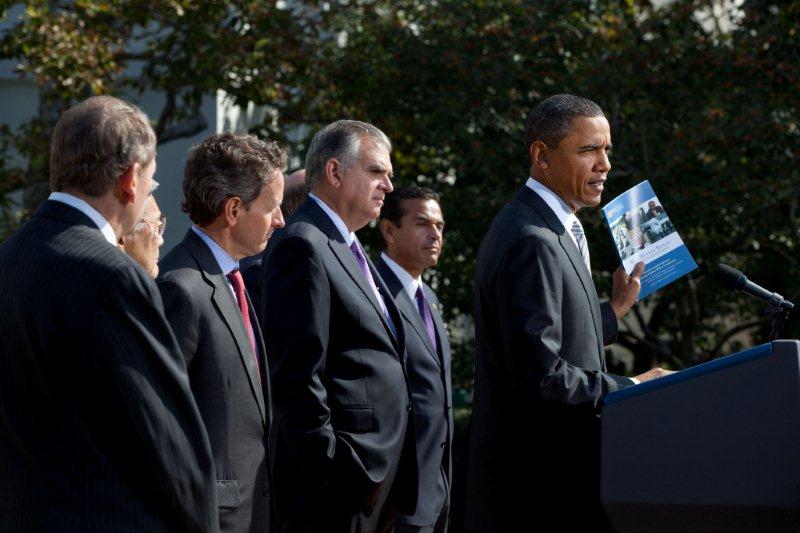
Our history
The Miller Center was founded in 1975 through the philanthropy of Burkett Miller, a 1914 graduate of the University of Virginia School of Law and prominent Tennessean. Troubled by the partisan rancor he saw developing throughout the nation, Miller envisioned a place where leaders, scholars, and the public could come together for discussions grounded in history to find consensus solutions. He founded the Miller Center in memory of his father, White Burkett Miller. Through Burkett Miller’s lead gift, as well as others by thousands of supporters, the Miller Center’s combined endowment now stands at more than $100 million.
The Center, under the oversight of its Governing Council, is an integral part of the University of Virginia, with maximum autonomy within the University system. Our programs are supported by the funds we solicit (through the Miller Center Foundation) and our endowment.
Fulfilling its role as a national meeting place, the Miller Center occupies an elegant physical plant of more than 15,000 square feet. The core of the Center’s facilities is the historic Faulkner House, built in 1856 and named for novelist William Faulkner, the University’s writer-in-residence in 1957.
Leadership
William J. Antholis is director and CEO at the Miller Center. The Miller Center is governed by a Governing Council while its finances are overseen by the Miller Center Foundation.
Prior Directors
Frederick E. Nolting, Jr., Ambassador to South Vietnam from 1961 to 1963 under President Kennedy, served as the Center’s first director, retiring in 1977. Herbert J. Storing, a noted scholar of constitutional history who had spent his career with the University of Chicago, led the Center’s presidential studies before his untimely death that same year.
Kenneth W. Thompson, a prolific scholar of international relations and the presidency, served as the Center’s director for more than 20 years, until 1998. Many of the Center’s hallmark programs began under Thompson, including the Forum series, the comprehensive oral history projects for successive presidential administrations, and the Center’s influential national commissions.
Philip D. Zelikow became the director of the Center in 1998, and the Center’s programming expanded significantly during his tenure. While on public service leave from the Center, Zelikow served as executive director of the National Commission on Terrorist Attacks upon the United States (the 9/11 Commission), before leaving the Center to become Counselor of the U.S. Department of State. In 2006, Zelikow left the State Department to join the faculty of the University of Virginia history department.
Gerald L. Baliles was director of the Miller Center from April 2006 until December 2014. During his service as director, he further enhanced the Center’s academic standing by adding to the faculty, among others, Bancroft Prize-winner Melvyn P. Leffler. He also conceived a series of new programs and annual conferences that enhanced the Center’s national reputation. Among these initiatives were the National War Powers Commission, the Mortimer Caplin Conference on the World Economy, and the National Discussion and Debate Series. Under his leadership, the Center continued to strengthen its long-running programs, particularly in presidential studies.
For my presidency, and for others, the Miller Center is a place that gets history and preserves it for future generations.
—President George H. W. Bush
